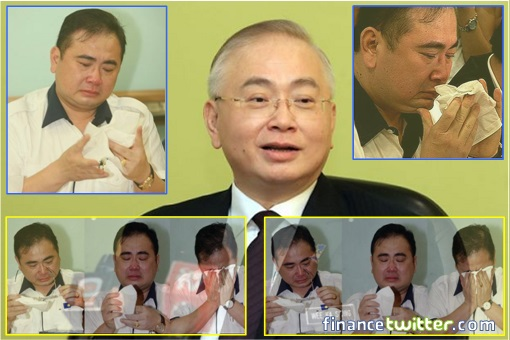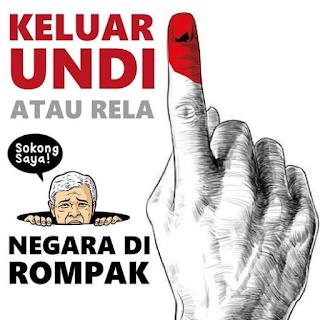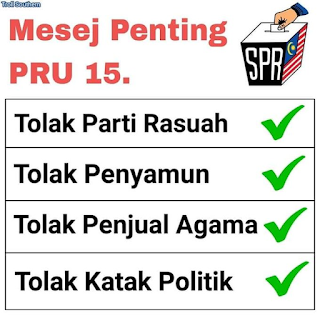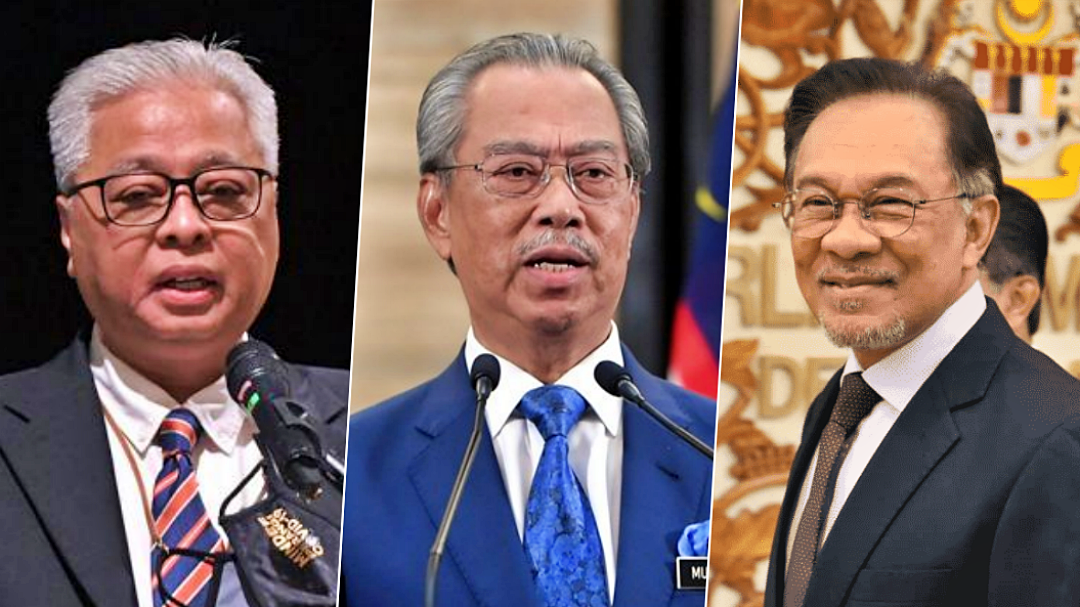Young first-timers - are they the GE15 kingmakers?....
Sumber asal: Young first-timers - are they the GE15 kingmakers?...
More about → Young first-timers - are they the GE15 kingmakers?...
The 15th general election will be the first nationwide election after the implementation of automatic voter registration and the lowering of voting age from 21 to 18 following the adoption of the Constitution (Amendment) Bill 2019. It remains to be seen whether first-time voters, in particular the 18-year-olds, will become the “kingmakers” in the coming election.
According to the latest electoral roll released by the election commission, a total of 21,173,638 Malaysians are eligible to vote in the upcoming election, an increase of 6,233,014 or 41.72% from the 14,940,624 in the 2018 election. In other words, if half of these first-time voters do come out and vote next month, their ballots should decide who will get to rule after GE15.
There was strong anti-establishment sentiment among young voters who came out in droves to vote for Pakatan and PAS in 2018. Unfortunately, very few first-timers turned up in the recent Johor state election.
Although as many as 1.43 million took part in this state election, the voter turnout was merely 54.92%, down sharply from the 74.5% recorded in 2018, and was the lowest among the four state elections held since the last general election. This means the drastic increase in the number of new voters will not assure us of high voter turnout.
Many might have the misperception that all first-timers are young people. Not true! Based on EC statistics, only 1,393,549 among the first-time voters are aged between 18 and 20, or a meager 6.58% of the total.
It is great that people reaching the age of 18 are now allowed to elect their representatives, but the thing is, the education these people have received at school does not imbue them with the awareness of exercising their citizens’ rights. Very few among the 18-year-olds are actually aware of the importance of the ballots in their hands.
These first-time voters can broadly be categorized into three groups. The first group comprises university students and people working in urban areas. This group of people generally have stronger political awareness and are more inclined to vote for PH.
The second group is youngsters living with their parents, and they are more likely to vote for the same people their parents will vote, especially if they are in rural areas. Their parents are predominantly BN supporters.
The last group is people totally indifferent to politics who have never before registered themselves as voters, and may not even be aware that they are already automatically registered this time. These people are relatively older. Although we do not have any official figures, their number is believably significant.
Sure enough there are also fence-sitters among the first-timers who cannot make up their minds whom to vote until the last minute. A Merdeka Center survey among youngsters early last year showed that more than two-thirds of respondents were uninterested in politics, no thanks to the political chaos prevalent over the past several years.
The survey also showed that 78% of respondents felt that politics and governance looked too complicated to them such that they couldn’t really understand what was going on, while 66% believed government officials and politicians were not keen on what they were thinking.
Such phenomenon is by no means unique to Malaysia. A 2020 New York Times survey among readers in 24 countries indicated poor voter turnout among the young people. From the outcome of the Johor state election, we saw that not all first-time voters were PH supporters. Many of them cast their ballots in favor of BN and PN instead.
In other words, any political alliance can potentially win the favor of first-time voters. If they can satisfy the demands of these voters and offer better promises to solve their problems, they stand a good chance of winning their hearts. To most young Malaysians, the most pressing issue is job prospect.
It is a big challenge for political parties to try to convince first-timers to come out and vote on November 19. But before that, they will have to think out of the box and map out their strategies with a new mindset in order to win over these new voters. We should be able to get a better picture of these new voters’ inclination after the nomination day, by gauging the response of candidates’ online ceramahs. - MySinchew
Liow Tiong Lai-The RM24,000 number plate,
RM600,000 Toyota Alphard bribe & sex DVD scandals....
Liow Tiong Lai, the 10th President of the Malaysian Chinese Association (MCA) from 2013 to 2018, has started attacking bitter rival Democratic Action Party (DAP) as the 15th General Election is going full steam. The ex-MCA chief is making a comeback to contest Bentong parliamentary seat, which he won in 1999 and defended it until his humiliation lost in the 2018 General Election.
At its peak, MCA had won a whopping 31 parliamentary seat under the leadership of Ong Ka Ting in the 2004 General Election. The political party that represents the ethnic Chinese won 1,074,230 votes. However, the party consistently lost half of its seats in the subsequent next elections – 15 seats (2008), 7 seats (2013) and finally only 1 seat in 2018 under Liow’s leadership.
By the time Liow led MCA, founded in 1949 before Malaysia’s independence in 1957, to its worst performance in the 2018 General Election, the party had already lost 95% of Chinese support to DAP. Even its sole survivor, deputy president Wee Ka Siong, was lucky to be able to keep his seat thanks to Malay voters in the Ayer Hitam constituency. Wee had won by merely 300 majority votes.
And now Liow has the cheek to lecture DAP, mocking the opposition party’s inability to keep its leaders in the same constituency from one election to another – allegedly because of unkept promises and poor performance. He said switching candidates to different areas has always been DAP’s culture, referring to the latest replacement of incumbent Wong Tack with Young Syefura Othman.
It’s public knowledge that MCA, one of the component parties of the Barisan Nasional (BN) coalition led by UMNO (United Malays National Organization), is UMNO’s lapdog. In fact, MCA lost the trust of the Chinese community it was supposed to represent because the party was and still is subservient to UMNO, the big bully who fed crumbs to corrupt MCA leaders.
The reason why Liow shamelessly bragged that unlike DAP, MCA consistently keeps its leaders in the same constituency is because MCA leaders have nowhere else to go. Since the 2008 General Election, where BN lost its two-thirds supermajority in the Parliament for the first time in history, MCA leaders – like beggars – have been hiding in Malay-majority seats.
For example, Wee Ka Siong, who cried publicly like a baby in 2009 after he (along with disgraced colleague Chew Mei Fun) was sacked as MCA central committee members, would have been slaughtered by DAP strategist Liew Chin Tong in 2018 if not for the 60% hardcore UMNO-Malay voters in Ayer Hitam. That’s why Wee keeps quiet every time Chinese are bullied by UMNO.
Likewise, despicable Liow Tiong Lai depended on 49% UMNO-Malay vote bank in Bentong, a constituency with only 38% Chinese and 10% Indian voters. Wee and Liow are laughing stocks because both MCA-Chinese leaders are hiding in Malay-majority seats, and none of them dare to contest in Chinese-majority seats like Bukit Bintang, Cheras, Damansara or Kepong.
However, Liow was partially correct to say Wong Tack did not carry out his duties as an MP. Wong was selected as a DAP candidate in the 2013 General Election largely due to his role as chairman of “Himpunan Hijau” (Green Assembly), an environmentalist protest movement against Lynas, a rare earth processing plant operating in Gebeng, Kuantan, Pahang.
Wong lost to Liow in 2013 by 379 votes, but defeated the former MCA president in 2018 with a 2,032 majority. As an environmental activist, Mr Wong’s mission has been all about fighting Lynas, and nothing else. That’s why he had never raised in Parliament any of the national issues like cost of living, corruption or unemployment. And that’s precisely he was dropped this time.
The fielding of deputy Youth chief Young Syefura to replace Wong Tack shows that DAP is sensitive and aware of Bentong’s unhappiness over Wong’s lack of performance. At least DAP has decisively and boldly took the necessary steps to rectify the problem. Wong should realize that he had won in 2018 under DAP and Pakatan Harapan platform, and not because he was a superhero.
Throwing tantrums upon being dropped, and quickly announced his decision to defend Bentong as an independent only goes to show he is not a team player. The immature lone ranger naively thought he was so popular that he could win without DAP grassroots and machinery. He thought Bentong was his personal property and DAP should be grateful to him for winning the seat in 2018.
The activist hadn’t a clue that in order to fight Lynas, every parliamentary seat counts in order for opposition Pakatan Harapan to win and form the next government. Only then can the Lynas problem be tackled. Even if he wins Bentong as an independent, which he won’t, he only has 1 vote in the 222-seat Parliament. Silly Wong will only help Liow wins by splitting the Chinese votes in Bentong.
Still, it’s not a walk in the park for Liow. The Chinese voters still remember how MCA became a full-blown eunuch under his leadership from 2013 to 2018, not to mention various scandals plaguing him. In 2008, MCA Youth Chief Liow called for the creation of a second deputy prime minister for MCA, a gimmick for him to win the internal MCA party elections.
Then-Deputy Prime Minister Muhyiddin Yassin shot down his proposal, mocking that a deputy premier for MCA would be useless even if the position was created. Hilariously, upon winning the MCA vice-president post, Liow made a U-turn and said – “One step at a time. Let us reform Barisan first. We reform Barisan, and only then we will reform the government.”
But the power-crazy Liow did not stop politicking even after MCA was insulted by UMNO. On January 1, 2008, the party plunged into sex scandal when MCA vice-president Chua Soi Lek was caught bonking his personal friend – Angelina Yam – in the sex DVD circulating in Johor. Four suspects were arrested, but only for distributing and having in possession material containing pornographic elements.
Instantly, room 1301 of the four-star Hotel Katerina in Batu Pahat, the place where Chua engaged in extraordinary sex with his woman friend, became popular. But the police did not, could not and would not arrest the “mastermind” behind the recording of Chua’s sex act. It was obviously an inside MCA job, believed to be linked to Liow Tiong Lai.
Chua said he was caught because he made the mistake of going “to the same hotel and the same room” for his trysts with the woman. On Jan 2, 2008, he resigned as Health Minister, MCA vice-president, Johor MCA chief and Labis MP. However, he made an unprecedented comeback nine months later, and was elected MCA deputy president in October 2008.
However, then-MCA president Ong Tee Keat used Chua’s sex scandal to expel him from the party in 2009. But it backfired and a vote of “no confidence” against Ong was passed by 14 votes instead. Chua’s expulsion was overturned during an EGM (extraordinary general meeting) in 2010. In the three-cornered fight of MCA election, Chua beat both incumbent Ong and former president Ong Ka Ting.
In 2015, sex actor Chua stunningly revealed how then-Deputy Prime Minister Najib Razak personally helped him to edit the speech used when he went on TV to admit as the person in the sex video. Praising Najib, Chua said – “At that time, when I drafted the speech to admit on television, I wrote it with Najib. I went to his house. He thought I wrote it in a way that was too rigid, so he edited it for me.”
More importantly, Chua criticized then-MCA president Liow for still bringing up the sex video because Liow was afraid that Chua would make a political comeback again. Chua said – “I think if you want to hurt me, you have already hurt me. I have already paid the price” – suggesting that Chua knew from the beginning that Liow was the mastermind behind the sex DVD scandal.
Planting spy cameras in the hotel room was not only Liow’s expertise. He had backstabbed and betrayed his own political mentor, Ong Tee Kiat. Heck, he even deliberately sabotaged MCA during the 2013 General Election, and blamed MCA president Chua Soi Lek for the huge loses so that he could use the party poor performance to call for Chua’s resignation.
Worse, Mr Liow was as corrupt as Mr Najib. In October 2009, a whistleblower exposed Axis Construction Sdn Bhd, one of the companies that received contracts from the Health Ministry, had paid down payment for a Toyota Alphard valued at RM574,884.10 as a birthday gift for the health minister’s wife – Lee Sun Loo. Of course, drama queen Liow denied that it was a gift.
Apparently Liow instructed his crony, “Dato Chai Kim Seng” to undertake design, build and develop a hospital in Kuala Selangor. Dato Chai then informed his partner Dato Benny from Axis regarding the RM25 million deal. The project was then awarded to a dummy 100% bumiputera-owned company – Mohd Hj Sirat Sdn Bhd – which in turn sub-contract the entire project back to Axis in order to hide that it was a direct deal.
Besides paying RM324,884.10 down payment (Hong Leong Bank cheque No: HLB 373727), the contractor also paid RM4,730 monthly payments for the MPV. In Dec 2009, Liow’s wife was interrogated by the Malaysian Anti-Corruption Commission (MACC) over the scandal. But politician Tiong King Sing allegedly bribed MACC with a whopping RM10 million to close the Toyota Alphard corruption case.
While the name Tiong King Sing might sound unfamiliar, he was the big boss of Kuala Dimensi Sdn Bhd, the turnkey contractor of the PKFZ (Port Klang Free Zone) project. Yes, Tiong King Sing was the same man popularly known within the circle of MCA as the “twin brother” of Wee Ka Siong (current MCA president, whose 47% in Hijau Sekitar Sdn Bhd was a sub-contractor of PKFZ).
Mr. Tiong, also known as the “Mafia Bintulu”, became a billionaire when he sold his Kuala Dimensi’s 1,000 acres (4.0 km2) of Pulau Indah land to Port Klang Authority for a cool RM1.8 billion, the same land he had bought for only RM95 million, thanks to his connection with Mr. Wee. The PKFZ soon exploded into a RM12 billion scandal due to cost overruns and financial irregularities.
The PKFZ scandal was so explosive and toxic back in 2008-09 that even the police during the era of corrupt Barisan Nasional regime had to freeze luxury cars, lands, a Gulfstream IV jet aircraft and a Learjet 60 aircraft belonging to Mr. Tiong under the Anti-Money Laundering Act. Of course, Tiong King Sing (Bintulu MP) didn’t go to jail, let alone Wee Ka Siong.
In 2012, another scandal hit Liow Tiong Lai after he won a tender for the number plate “WWW 15” – which cost a jaw-dropping RM24,200. It would take 4 weeks for him since the scandal exploded to defend his bid for the lucky number, arguing that it was for his new official car. However, when grilled, he could not answer why such a large sum of money was spent on a number plate.
Comically, he claimed that his ministry did not pay for it, but at the same time, he was unsure who had paid for the number plate. Playing down the scandal, Liow had even said he bid for the number plate because it was the number of his grandfather’s car. Facing tremendous pressure, then-Health Minister Liow Tiong Lai reluctantly gave up his favourite “WWW 15” number plate in June 2012.
Like Najib, Liow was also a spectacular liar. During the Bersih 2.0 demonstration in 2011, Tung Shin and Chinese Maternity Hospitals were attacked by tear gas and water cannons unleashed by the police. The police had even attacked the safe sanctuaries of hospitals, launching an unprovoked violent assault within the hospital compounds to arrest peaceful protesters seeking shelter.
However, during a press conference, then-Health Minister Liow had lied when he claimed that the police did not shoot tear gas or water cannon into the hospital, despite video recordings showing otherwise. The disgraced MCA leader said – “Maybe the smoke was blown by the wind in this direction. As for the water cannon, maybe it had only brushed the edges of the hospital walls.” - FT
cheers.
Sumber asal: Young first-timers - are they the GE15 kingmakers?...




































